Unhappy with your item? We offer no-quibble free returns
Sourced through ethical and sustainable accreditations
£3.95 standard UK shipping, or free shipping over £40
Every purchase you make supports wildlife
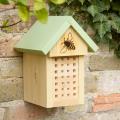
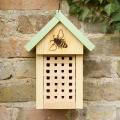
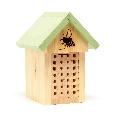
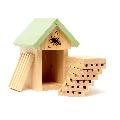
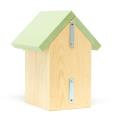
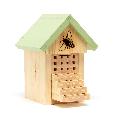
Solitary bee home
- Specially designed for leafcutter and red mason bees
- Made in the UK from FSC® certified pine
- Has a roof with overhang to protect bees from the rain
- Optimal 15cm hole depth ensuring plenty of eggs are laid and protected
- Removable trays for inspection and cleaning
FREE UK delivery with orders over £40
Product description
Specially designed for two common bee home dwellers; the leafcutter and red mason bees. This high-quality bee home comes with removable nesting trays, metal fastenings for secure sitting, and an overhanging roof to protect bees from the rain. The apex roof is painted (using non-toxic paint) a light sage green and matches the style of some of our most popular bird nest boxes.
- Made in the UK
- Measures 28cm (H) x 20cm (W) x 20cm (D)
- Bespoke 8mm and 10mm nest holes for red mason and leafcutter bees
- Optimal 15cm hole depth ensuring plenty of eggs are laid and protected
- Removable trays for inspection and cleaning
Cleaning advice
We would recommend cleaning the home every 1 to 2 years. You can either clean your home once nests have vacated in spring or at the end of the breeding season (late September to October). The trays can be cleaned with a brush and mild, non-toxic disinfectant such as Ark-Klens.
If you are cleaning in late September-October, please carefully remove any bee cocoons present and place these in a ‘release box’ where they will stay until the following spring.
A small container, ideally made of natural materials such as cardboard or wood, can be used as a ‘release box’ (e.g. a capped toilet roll). Avoid metal containers. Plastic boxes can be used, but the lid should be left loose and the bottom lined with tissue to prevent condensation. The box will need a small hole (minimum 10mm diameter) to allow bees to emerge in spring.
The release box should be kept in a cool, dry location (such as a garden shed or garage) during the winter months and then placed outside in the spring for the bees to emerge when they are ready.
Did you know we have over 260 species of bee in the UK?
Rather than living in colonies, the vast majority of our bees are solitary, with each female building her own nests.
These non-aggressive, highly efficient pollinators are important to our ecosystems and economy, including the pollination of many of our wildflowers and fruit and vegetable crops.
Having a variety of pollinator-friendly plants in your garden from March to September is a great way to help while providing a safe, cosy nesting site will also make a big difference.
- Free UK delivery for orders of £40 or more (or £3.95)*
- Please allow 3-5 working days for in stock items to be delivered
See our delivery and returns page for full details.





